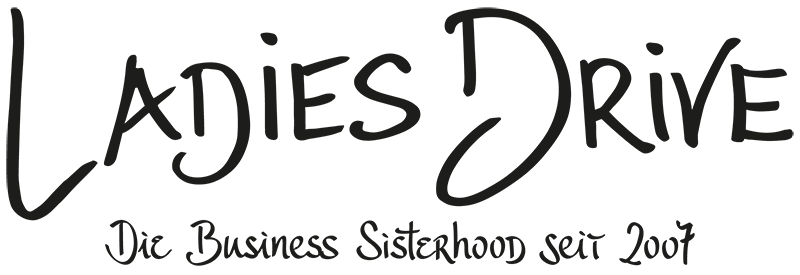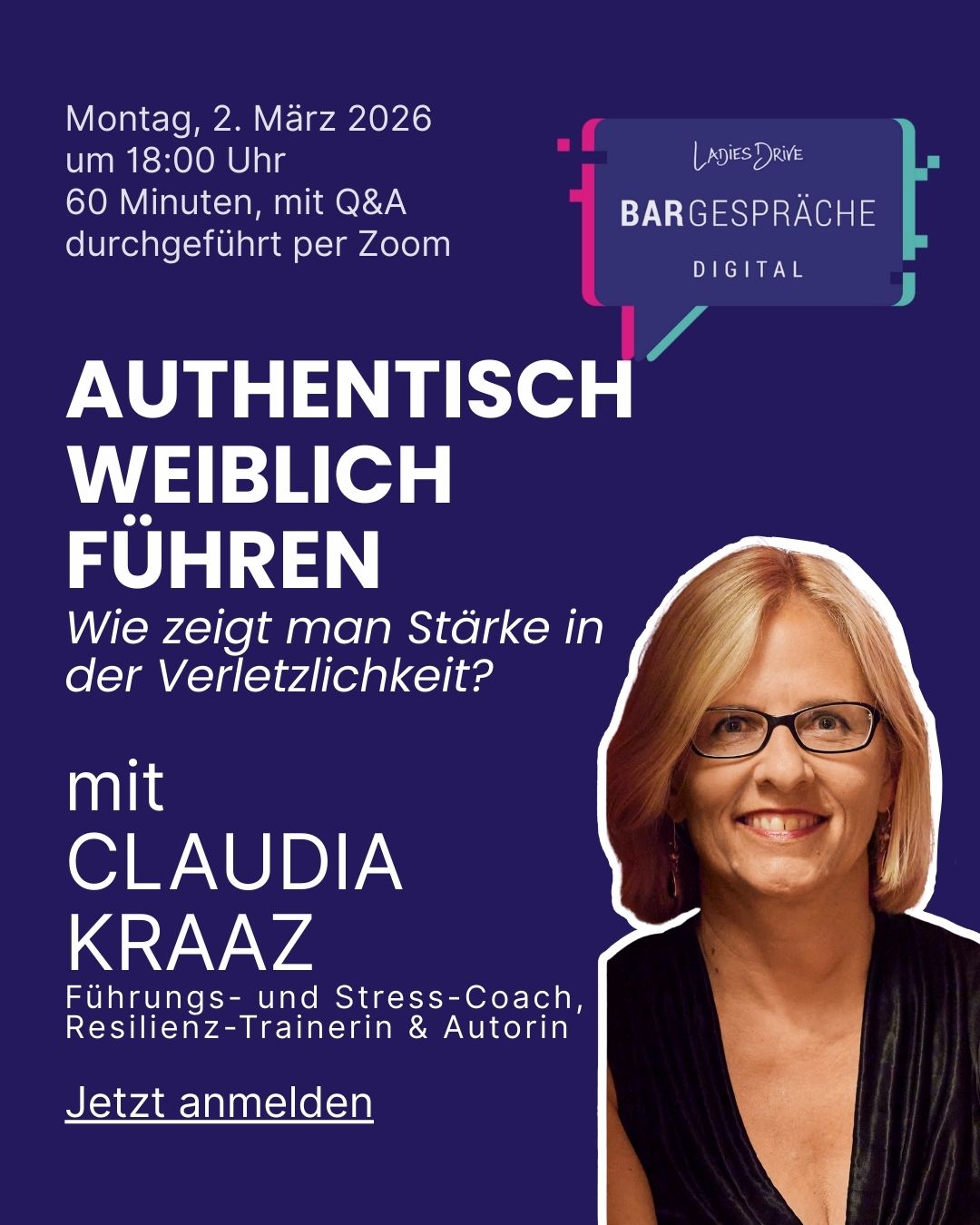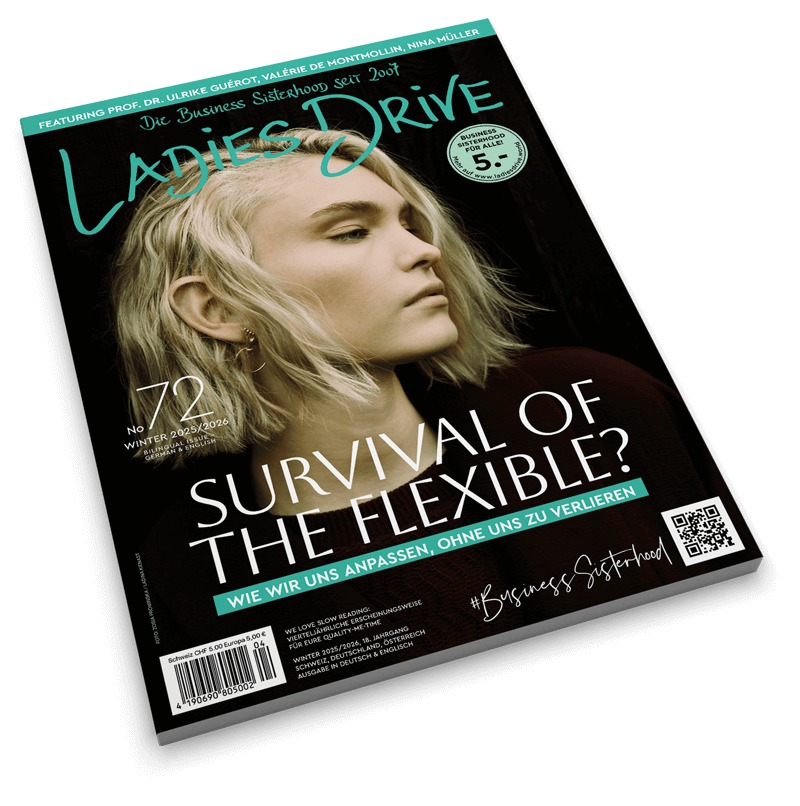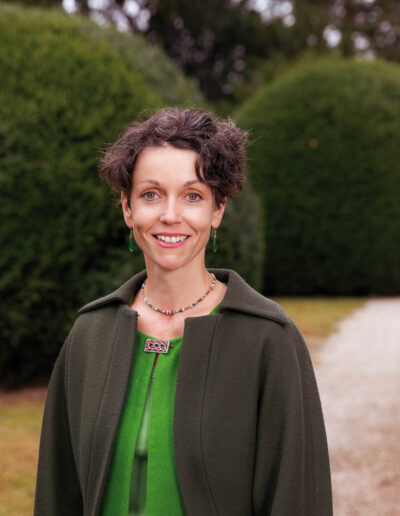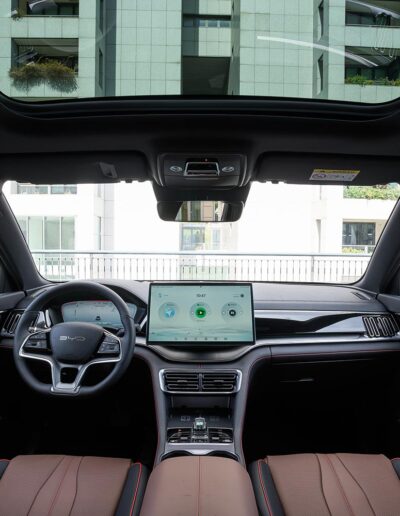I love to read. One book that particularly resonated with me was Humankind by Rutger Bregman (in German: Im Grunde gut). I was blown away and immediately reached out to Rutger to explore the kindness of Homo sapiens with you all. His team redirected me to an amazing young woman with whom Rutger had just founded “The School for Moral Ambition.”
Their motto: put your ideals to work.
Their mission: they want to help as many people as possible take the step towards a job with positive impact.
The founding team: bestselling author Rutger Bregman, designer Harald Dunnink, former consultant Jan-Willem van Putten, entrepreneur Ruben Timmerman – and former banker Julia van Boven (34).
When I met Julia on Zoom to conduct this interview, I encountered an extraordinary human being: a young woman, deeply inspired to find solutions in a world that seems adrift in troubled waters.
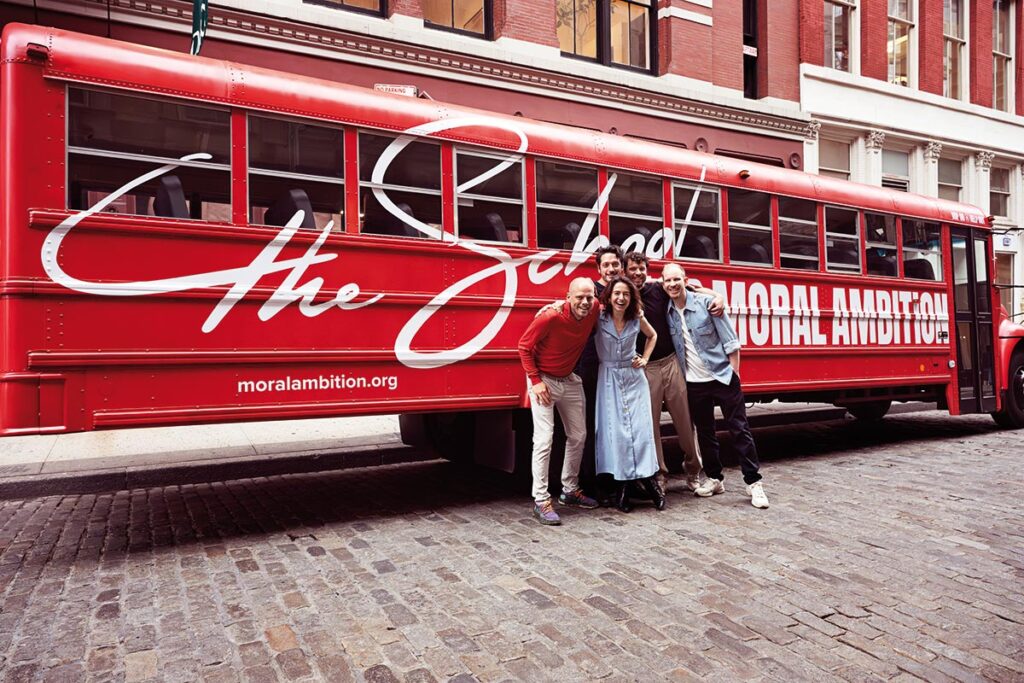
Ladies Drive: I’m so happy I read Humankind – because it led me to you!
Julia van Boven: Wow, so cool – thank you!
What’s the scent of your childhood?
It’s funny – I’m very visually oriented, so scents don’t come to mind immediately. But one thing I do think of is brownies. My mother is American, and on the best days, we would bake brownies together. So that’s definitely one.
How can we imagine you growing up?
I was born in Amsterdam and raised in Haarlem, a town 15 minutes away. When I was ten, my parents made a bold decision to move to Middelburg, a small town two-and-a-half hours away. My grandfather was living in Australia at the time, and during a trip there, my parents realised how much more relaxed and laid-back life could be. They asked themselves why they were working so hard to pay a high mortgage. They saw some friends going through divorces and thought, this isn’t the life we want. That’s how we ended up in Middelburg. When I turned 18, I moved back to Amsterdam.
Did you have a clear career ambition growing up?
Yes, I always thought I would work in business. I planned to study economics. But during my final high school exam, the reading text argued that Dutch businesspeople rarely reach top-level positions due to their narrow education – mostly law or economics – unlike Americans, who tend to have a broader academic background. I remember sitting there thinking, That’s not going to be me. I won’t be a mediocre manager somewhere in business! I went home and told my mother I was no longer going to study economics – I would study philosophy instead, to try to make sense of the world.
After a year, I thought I’d combine it with business. But when I started at the university’s economics department, I found the students deeply unmotivated, and I was so uninspired that after a month I dropped the idea altogether. I decided to focus on philosophy and see where it would lead. I completed a bachelor’s degree in Philosophy and a Master’s in Applied Ethics.
What was your first paid job after university?
After university, I asked myself: Why do we have a government? Isn’t it supposed to protect citizens? Or why do we have human rights? We say everyone is equal in dignity, and that’s why we created them. So how is it possible that businesses still violate human rights? Why can kids still buy cigarettes? Why doesn’t Shell pay more taxes? I just didn’t get it. I assumed maybe it was the lobbyists – that they were influencing governments too much. So I started working as a lobbyist for human rights organisations to see whether it was possible to lobby for ethical business practises – to lobby for good. And I learned that it is possible.
But I also discovered that lobbying wasn’t for me. I’m far too impatient, and lobbying requires a great deal of it. There was also constant discussion about money, because non-profits never have enough. Then my dad made a proposal. He used to be a legal professional but had started a business in the food industry with his best friends. He asked me whether I wanted to help found a business with them – and I did.

We opened three shops selling slowly cooked organic takeaway meals, using as many local and sustainable ingredients as possible. But after one and a half years, it still wasn’t successful enough. With a philosophy degree, I wasn’t exactly a natural businesswoman. We had to close it down.
I was 25, and most of my friends were just starting corporate traineeships. I thought, I’ve really failed. I felt very insecure and asked myself: what can I actually do?
I decided I needed time to think. I found a Buddhist monastery in the north of the Netherlands where you could stay for €10 a night. I left my phone at home and stayed there alone. And in that silence, I thought: when I’m on my deathbed, or when I have to explain my life to my children or grandchildren, I want to be able to say I contributed to solving the big challenges of our time.
When I left the monastery, I decided to go into banking. As an entrepreneur, I had realised how crucial financing and cash flow are. I figured that if I worked in a bank, companies would have to listen to me – something they wouldn’t do if I were just a 25-year-old philosopher.
So I wrote a letter to a bank and said, you’ve probably never received a letter from an ethics professional before, but I think you badly need one. It was one of the most polluting banks – but they hired me as a management trainee. I never expected them to, but they did. That was the start of more than seven years in banking.
And could you change something while working in banking?
I think yes. Of course, you never know how lasting it is, but when we started, I was lucky enough – together with one colleague – to set up a new department from scratch. We spent a whole summer thinking about what was needed to make this bank a sustainable one. We drafted a rough outline of a strategy saying: we need education for bankers, we need to build a community, we have to make it cool to finance sustainable companies instead of just the traditional ones. We also need financial products – something profitable, but that does good. And we need to measure how many sustainable activities we actually finance, because that wasn’t in place at the time.
We then spent seven years executing this plan. It was successful – we financed over a billion euros in circular companies. We developed many ways to help more traditional clients transition to sustainable models, using financial instruments as well as workshops and half-year innovation programmes. Like: how do I get my business from traditional to circular? When I left, our team counted 40 people.
So why did your banking career end? What happened?
A lot of things. One was that I started teaching philosophy again on the side – applied ethics, to adults. It gave me time to think: what does sustainability really mean? What do the rights of future generations really entail? As I became more critical – even of the bank I was working at – I began to ask: what does it actually mean to “bank for future generations”? We all say this, but do we really act on it? And I thought: actually, not enough.
So I started bringing more philosophy into the bank, which led to the creation of a “Future Generations Board” as part of the bank’s governance structure.
That gave me access to many C-level executives. And on the one hand, I was inspired – this organisation had the capacity to really change the world: connections, money, access. But I was also disappointed by the lack of courage. Security and comfort were valued higher than courage, impact, or compassion for those less fortunate than us. That disappointed me. Still, I’m very grateful for the people I met and the opportunities I had.
At some point, I read an article by Rutger Bregman about a school in London he called the “Hogwarts for do-gooders” – Ambitious Impact. I had long dreamed of starting a high-impact organisation, but I didn’t know what exactly. The article described an accelerator programme – not backed by loads of VC funding – but aimed at helping people found or co-found the world’s most effective charities. Reading it, I thought: whoa, there’s a place in the world where people think like me – and are even more morally ambitious! That was the moment I told all my colleagues at ABN AMRO: I’m quitting. But I doubted myself. Why would they pick me for this programme? They get 4,000 applicants and only select about 10. Why would they choose a banker? Then someone told me that Rutger had this idea of starting a nonprofit called the School for Moral Ambition. For me, everything clicked.
So you touched base with him?
Yes. I thought: Rutger understands impact – but he doesn’t have a connection to business, and I do. So I wrote him an email: “Hey Rutger, are you looking for a co-founder? I think you need me – and here’s why.” Of course, I didn’t get a reply. Rutger receives a lot of emails. But then I heard from a colleague that he knew one of the other co-founders. Three days later, I was having coffee with Jan-Willem van Putten. He told me they just had a Google Doc and this idea, along with Rutger’s new book, Moral Ambition. But they thought: it should be more than a book. Moral Ambition could be a movement.
Jan-Willem’s organisation, Training for Good, already ran fellowships. They were like the Robin Hoods of talent – recruiting top tech talent from Silicon Valley and placing them in policy organisations, lobbying for better AI regulation in Brussels, for example. With Rutgers’ book – they would extend the scope and increase the number of these programmes.
Both already though that we should add something more accessible than the fellowships, so everyone who feels called by the concept of Moral Ambition can join. When I heard Jan-Willem talk about the idea of building a community of ambitious idealists, I got really excited. That’s what I’d been doing for the past seven years!
He told me I could pitch this idea to the other co-founders – including Rutger. I remember spending two full weeks every evening crafting the best pitch I could on how to build a global community. I told them: “I’ll need just one hour of your time to do the pitch in person.” And they gave it to me. I gave the pitch – and three days later, we started building this global community.
In a nutshell, what does the School for Moral Ambition do?
The reason we exist is that we believe the people with the greatest talents should work on solving the world’s biggest problems.
And we define those problems with a framework we call the Triple S Framework. We look for problems that are sizeable, – meaning lots of beings suffer from them now or in the future – solvable, so there are actual solutions to be found, and sorely overlooked, meaning not many people are working on them or not much funding is going into solving them. What we do is find the most effective ways to move talent towards working on these problems. We do this in three ways:
First, we run large-scale campaigns.
Second, we operate SWAT teams – our fellowships – where we recruit 10 to 12 top talents with an average of 10 years’ work experience. Often these are former McKinsey consultants or people from high-paying corporate roles who quit their jobs. We pay them an average Dutch salary to work full-time on some of the biggest challenges of our time. Currently, we have two fellowships running. One is the Food Transition Fellowship. We chose this because billions of animals suffer every day in factory farming. It’s our mission to end factory farming within our lifetime. Of course, this will also contribute to fighting climate change and protecting biodiversity.
The second topic we’re tackling is tobacco control. I didn’t know this before starting the school, but every year, eight million people die due to smoking-related illnesses. This is entirely preventable. We focus on the tobacco endgame: regulating this harmful industry so that children born today will no longer be able to start smoking. If we raise enough funds, we will launch a third fellowship dedicated to introducing a global billionaire tax. We know this is a long game, but we believe it will significantly contribute to reducing global inequality.
So controlling social media is not part of your game plan?
At the moment, not through the fellowships. But we already have 16,500 people from over 130 countries who have joined our Moral Ambition community. We self-organise into Moral Ambition Circles – small groups of six to eight people who share the urge to create positive change. But often, it takes time and reflection to figure out how to act. We need courage. We need support. And these circles – which we offer for free – help people collectively explore how they can make the biggest contribution. We provide a long list of causes we believe are worth dedicating time to – including youth well-being, mental health, and regulation of artificial intelligence. I think that’s very relevant for your community. Several circles have already started in Switzerland – groups of morally ambitious individuals helping each other to step up and follow through. That’s wonderful. Also, 230 Circle participants have so far pledged to change the course of their career.
And how is it to work with your other three co-founders – and this big personality?
First of all, we have a lot of fun. We spent a lot of time together in New York during our global launch, working 14-hour days. But I felt like I’d just come back from a festival – we laughed so much. We’re also critical of one another. We all come from different backgrounds – one from the non-profit sector, one’s an entrepreneur, one’s a journalist, one’s a designer – so we approach things from very different angles. That’s a strength, but it also means we sometimes have five strong opinions in the room. It takes navigation. And being the only woman, I do sometimes feel like, “Hey, what does that mean?”. There are moments when I get quite angry – thinking, “You just don’t understand!” (laughs). Sometimes I struggle to find the right words to express what I mean. But I also know: anger doesn’t do the job.
Why do you think moral ambition can change the world?
Because it gives a name to something many of us already feel. It allows people to identify as morally ambitious. We are also lucky to have a gifted writer like Rutger on board – someone who can communicate this vision in a way that’s easy to understand and emotionally resonant. He inspires people to join us. That’s truly a gift – to be able to work alongside him on this.
As a philosopher and now as a co-founder of the School for Moral Ambition, can you make sense of the world as it is right now? Because the world is a pretty troublesome place at the moment.
I think there is a lot of harm being done. And it makes me very sad to realise how those affected now will suffer consequences that extend generation after generation, making life harder and diminishing the chance to lead a fulfilling and flourishing life.
But what I try to do is overcome the sadness. I try not to sit with my feelings too long, but instead turn them into action. I think that’s what is highly needed: to motivate ourselves to ask what we can actually do, and then to organise. For me, that’s the only way forward – to look for solutions, to collaborate, to think deeply and strategically in order to make change possible.
I motivate myself to stay optimistic by focusing on what can be done, and by connecting with people who share a similar mindset and want to take action. That’s what I see happening every day in the moral ambition circles – with people from all over the world whom I train – who are ready to unite, to step up, and to ask: what can I actually do? I believe that’s what is required in these difficult times: focusing on what we can do, rather than what we cannot.
A lot of people feel stuck. They don’t think they can change much.
Well, for example, you could start a high-impact organisation or work for a charity. But you can also stay in a well-paid job and decide to donate, say, 10 per cent of your income to the most effective charities. That’s something we promote. We call it the 10 per cent pledge with Giving What We Can, which is already a community of over 10,000 people donating a tenth of their income to the most effective charities. Or you could volunteer, or build a movement – whether political or our own – by starting a circle. And sometimes the best thing you can do is stay in your current organisation and help drive change from within. But for any of these paths, you need a vision: what does the world look like when it’s good – when people flourish, when there is peace, when animals live lives worth living? Rutger points this out in his latest book: no one is born morally ambitious. What he found in sociological research is that 96 per cent of people who joined the resistance during the Second World War did so simply because they were asked. That insight has really stuck with me in my role as Community Director. It shows how important it is to surround yourself with people who raise your ambition – who don’t say, “Oh no, don’t do that,” but rather, “Think bigger.”
What does the world look like in your ideal vision?
That’s a hard question, but I’m always deeply inspired by the work of Martha Nussbaum. She’s an American philosopher, and she developed the Capabilities Approach. What I love about it is that she defines a basic threshold of things every human being needs: play, education, shelter, food – ten basic things. Once those basic needs are met, then we can start to flourish. In my ideal world, all beings – human and non-human – can flourish in the way that is natural to them, and have the space and environment to do so.
A lot of indigenous tribes did and still do that.
Yes! What I love about the indigenous work I’ve read is that it’s not about more ambition – which can become very individualistic. That’s how we often operate in the West. But in many indigenous traditions, it’s more about relationships. The relationships between different entities are seen as more important than the entities themselves. Sometimes it’s hard for us to fully grasp what that means. But it’s about harmony and balance. I believe there’s still a lot to learn there. Many people today are caught in a hedonistic treadmill. You never have enough, you always want more. Since your community includes many people in business, I want to mention one initiative I hadn’t brought up yet, but which could be interesting. Last week, we held our biggest conference to date, organised together with Peter Singer – the well-known applied ethicist whose work shaped the effective altruism and modern animal welfare movements.
Now, together with him, we’re launching a new movement called Profit for Good. The idea is simple: companies donate at least 10 per cent of their profits to the most effective charities.
It was incredibly inspiring. We brought together companies from Australia, Bangladesh, and the US – all of them already doing this. One of them, Humanitix, a ticketing agency also launching soon in Switzerland, donates 100 per cent of its profits to high-impact causes.
The whole reason these companies exist is to earn money without harming others – and to give that money so others can solve problems that don’t have a business model. Some things can be solved through business, but some simply can’t. This is such a powerful movement. We’re seeing many businesses in the Netherlands already join in. For example, Rituals – you may know the wellbeing brand – has committed to donating 10 per cent of its profits and is fully on board. I really believe this is the most urgent time to become morally ambitious.
